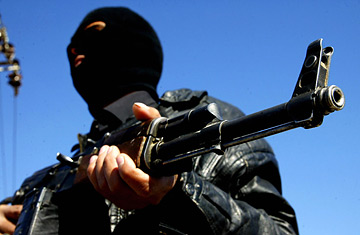
A Shi'ite Iraqi al-Mahdi army militiaman.
The soldiers joke darkly when they talk about what was left of Iskandariyah's mayor after he was blown up by a powerful roadside bomb called an EFP earlier this month. They have to. The details are so horrible that one either laughs or cries, or falls into that numb, silent stupor known to combat-hardened troops as the thousand-yard stare. They know EFPs are often aimed at them.
The troops perk up and start speaking more soberly, though, when they discuss the recent breakthrough following that ugly assassination, a breakthrough that has left the local chapter of their Mahdi Army enemy reeling and has local U.S. Army soldiers feeling like they've turned a corner in an pivotal area of south-central Iraq.
Last week, after two Sunni men were gunned down by Shi'ite militants in the sectarian hotspot of Haswah, near the city of Iskandariyah, Sunni members of a citizens' paramilitary group led Iraqi and U.S. military officials to the main Haswah mosque, where they told officials that the gunmen were celebrating their recent kill. With permission from the highest echelon of the U.S. command and Iraqi government in Baghdad, a specially trained Iraqi Army unit raided the mosque while U.S. forces stood by with additional firepower. The Iraqi soldiers returned with a booty no one had expected: several local commanders of the Jaish al Mahdi, including the top commander in the region, who came in at number two on the Army's most wanted list.
Army officials say they believe the detainee known as Abu Karam gave the orders to assassinate Iskandariyah's mayor and was in charge of special Iranian-trained cells that plant the powerful roadside bombs known as EFPs, explosively formed penetrators, to kill American GIs in this volatile area south of Baghdad. The capture threw the local Jaish al Mahdi into a crisis, leading two top-tier leaders to knock on the gates of the nearby American base two days later asking for an audience with the American commander there. It was the first time the leadership of the JAM, as it's commonly known, had made such a bold overture.
TIME was present at the six-hour meeting as the militants tried to cut a deal. Let them see the top three prisoners and they would shut off all attacks against U.S. forces in Haswsah, they said. The American negotiators were skeptical but nevertheless got approval for the JAM delegation to see the detainees from a distance of about 10 meters in the prison yard. It was a vast departure from the old "we don't deal with terrorists" line of the Bush Administration and early commanders of the U.S. occupation, but quite in keeping with the spirit of a new counterinsurgency strategy taking shape across Iraq that has not only reached out to insurgents but enlisted them in a fight against Shi'ite and Sunni radicals alike.
After the cross-yard engagement, in which the JAM emissaries shouted emotional greetings to the captives that seemed to U.S. officials like veiled attempts to assure the leaders that their capture was not an inside job, the delegation left the U.S. base, obligated by their promise to end the attacks. Even more incredibly, the men left with a promise that there would be a pro-American rally in the town at precisely 10 a.m. the next day, sponsored by none other than the American's main enemy in the region, the Jaish al Mahdi.
Befuddled by the crush of developments and not trusting the JAM, yet curious to see what would happen next, the local American commander sent his men out on night and early morning patrols to the Haswah area as usual, even amid radio reports that the main routes were laden with freshly planted EFPs and that at least 1,000 JAM reinforcements were on their way down from Baghdad's Sadr City, the massive JAM stronghold in the capital. The Americans knew whom they would apprehend in the event of a JAM attack: the lead JAM sheik in the negotiation said he would take full responsibility for any subsequent violence.
But the next morning came and went without incident. U.S. troops patrolled the town without being attacked. The parade, which the Americans never took seriously, never took shape. You win some, you lose some, U.S. soldiers joked. Still, nearly a week has passed without violence in Haswah. Meanwhile, the detainees remain in custody and tips from the community keep pouring in in the wake of the recent bust. On Wednesday, U.S. troops in the area were led to a cache of more than 100 copper disks, the deadly projectile component of EFPs. Military officials say it was one of the largest EFP caches found in more than a year and another big dent in the local network of Shi'ite militants bent on planting them. In a region where troops say they often take one step forward for every two steps back, another step forward is worthy of note. Either way, it's a deadly dance in a place where the music never seems to stop.
